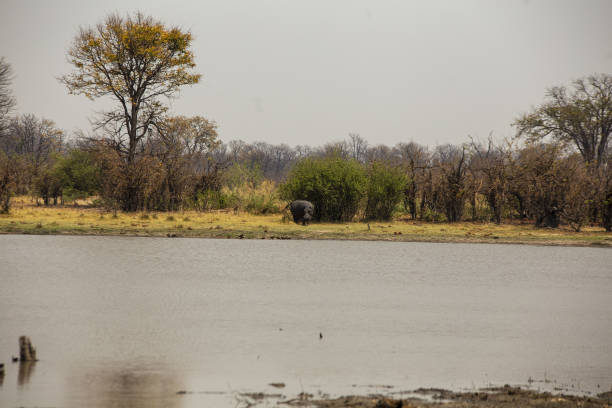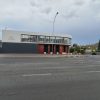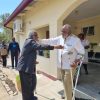Omanyano ovanhu koikundaneki yomalungula kashili paveta, Commisiner Sakaria takunghilile
Veronika Haulenga
Omanyano ovanhu koikundaneki yomalungula kashili paveta, Commisiner Sakaria takunghilile
Veronika Haulenga
Listeners:
Top listeners:
-
play_arrow
Omanyano ovanhu koikundaneki yomalungula kashili paveta, Commisiner Sakaria takunghilile Veronika Haulenga
Unveiling environmental activism: Ina-Marie Shikongo’s artistic resistance against threats to the Okavango Delta


By Kate Okorie, via Bird Story Agency
“This piece is for Ken Saro-Wiwa,” said Ina-Marie Shikongo, pointing to a textile collage shaped like an inverted dome hanging above the grey sofa where she was seated, surrounded by other artwork referencing the earth’s warming climate.
In a world often muted by diplomacy, Shikongo stands out as a defiant burst of unapologetic activism. Since 2020, the Namibian climate activist has used her art to fight a looming environmental threat to the wildlife-rich Okavango Delta. Shikongo and other activists have made their presence felt at COP28, hosted by the United Arab Emirates’ most populous city, and her work is a clarion call in a city not known for its activism.
Before facing capital punishment, Nigerian environmentalist Ken Saro-Wiwa led a non-violent campaign calling out foreign oil companies, particularly Royal Dutch Shell, for degrading lands in the Niger Delta region through their oil drilling activities. Despite calls for clemency from Nelson Mandela and other world leaders of the time, Nigeria’s military leader Sani Abacha had Saro-Wiwa put to death.
Shikongo references the Niger Delta in her calls to prevent environmental disaster in the Cubango-Okavango River Basin, an extension of UNESCO World Heritage Site, The Okavango Delta.
I
n December 2020, Canadian firm, Reconnaissance Energy Africa (ReconAfrica), announced that it had begun exploring for oil in the Basin. In a similar fashion to the actions of Saro-Wiwa, Shikongo, together with Fridays for Future (FFF) activists, took to the streets to protest.
The activists say the exploration in the Cubango-Okavango River Basin has dire consequences for interconnected water bodies, including the Okavango River and Botswana’s Okavango Delta, a vast inland area which houses diverse plant and animal species and significantly contributes to Botswana’s economy.
“Without the Okavango River in Namibia feeding the Okavango Delta, it would cease to exist,” said Shikongo.
Shikongo contended that the ReconAfrica project mirrored Shell’s early activities in the Niger Delta and was driven by a colonial-style agenda with no benefit for residents who may be forcibly displaced.
On January 11, 2021, less than a month after its announcement, ReconAfrica initiated its first oil drilling test in the area.
“The local community told me that the water’s taste has changed, but proving it has been challenging because they lack funds to take the water samples to the laboratory,” said Shikongo.
But Shikongo is not giving up. Earlier this year, ReconAfrica paused its mining activity in the Okavango River amidst reports of inadequate funding.
“When I am defending the Okavango Delta, I am reminded of what Ken Saro Wiwa did and today, we can see the extent of the environmental pollution in the Niger Delta region, due to oil exploration. This is why we have to protect the Okavango Delta because we don’t want another Niger Delta in Africa,” Shikongo said.
She said she believed that the protests against the oil company might have deterred potential funders.
“No matter what people say, there is power in our work because our campaigns are creating change.”
Shikongo further highlighted concerns over the ReconAfrica project that reach beyond the company’s recent oil exploration, pointing out the company’s failure to adhere to due process.
“The laws they broke in the Namibian constitution were land grabbing; they didn’t have permits when they started, and there was no community engagement.”
She still hopes the Namibian government will impose appropriate sanctions on the oil explorer. Already, the company is facing two lawsuits, one in the United States and one in their home country, Canada.
“I’ve heard they plan to resume drilling in January 2024, but I’ll be ready for them.”
Concluding with determination, she said she would continue using her art to raise the alarm.
“Art for me is an extension of my voice because talking is one thing but art helps me reach a different audience that I cannot always reach,” she said.
bird story agency
bird story agency
Written by: Contributed
art activism climate activism community engagement conservation efforts Cop28 Environmental Impact environmental peril environmental protests Fridays for Future Ina-Marie Shikongo Ken Saro-Wiwa legacy legal action Namibian activist oil exploration Okavango Delta Reconnaissance Energy Africa
Similar posts
Water for life and industry
By: Angie Scholtz The Orano Erongo Desalination Plant is a seawater desalination facility located in Namibia, near the coastal town of Wlotzkasbaken in the Erongo region. It was originally built by Orano (formerly Areva) to supply water to the Trekkopje uranium mine. However, due to the mine’s suspension, the plant […]
Windhoek Weather
Most popular

Namdia Heist: More questions, lots of confusion

Omuhwahwameki Michael okuunganeka oshikonga shoku patitha oostola dho Rani moshilongo ashihe.

Walvis Bay woman loses over N$777.000 to a fraudster

Don’t let Pohamba’s tears over Nujoma’s death go to waste

Justice Served: Jandre Dippenaar Found Guilty of Six Murders in Swakopmund Court
Copyright 2025 Future Media (Pty) Ltd | Website by Digital Platforms
Tel: +264 83 000 1000 | Email: news@futuremedia.com.na




